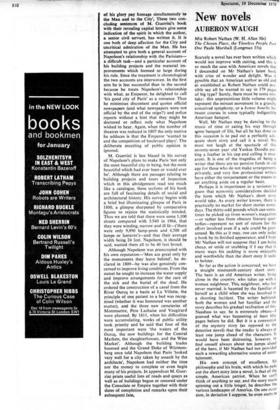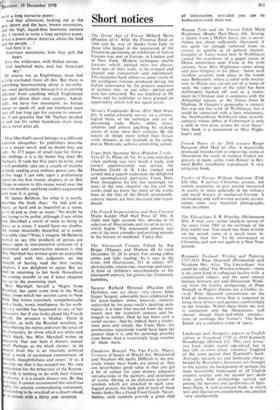New novels
AUBERON WAUGH Mia Robert Nathan (W. H. Allen 30s) The Chosen Pla( e, the Timeless People Part One Paule Marshall (Longman 35s)
Scarcely a novel has ever been written which would not improve with cutting, and this is so much the case with American novels that I descended on Mr Nathan's latest book with cries of wonder and delight. Was it possible that an American author as old and
as established as Robert Nathan could pos- sible say all he wanted to say in 179 pages of big type? Surely, there must be some mis- take: this unpretentious little volume might represent the minuet movement in a grandly conceived symphony, or a bonne bouche be- tween courses in some typically indigestible American banquet.
Well, Mr Nathan may be dancing to the music of time or eating his way through Mme banquet of life, but all he has done on this occasion is to pad out a perfectly ade- quate short story and call it a novel. We must not laugh at the spectacle of this seventy-seven year old Yankee Doodle put. ting a feather in his cap and calling it mac- aroni. It is one of the tragedies of being a writer that there are no pension funds in old age for those who do not make arrangements privately, and very few professional writers have either the temperament or the means to set anything aside on a regular basis.
Perhaps it is impertinent in a reviewer to guess that economic considerations decided the form which Mr Nathan's short story would take. As every writer knows, there is practically no market for short stories nowa- days. The thirty-odd pounds which can some- times be picked up from women's magazines —or rather less from obscure literary quar- terlies—represent no sort of return for the effort involved even if a sale could be guar- anteed. Be this as it may, one can only judge a book by its finished appearance, and I hope Mr Nathan will not suppose that I am being cheap, or snide or snubbing if I say that in many ways his padding is more enjoyable and worthwhile than the short story it seeks to bolster.
So far as the action is concerned, we have a straight nineteenth-century short story. The hero is an old American writer, living alone in the country, who takes up with a woman neighbour. This neighbour, who has never married, is haunted by the familiar of herself as a child when she was involved in a shooting incident. The writer befriends both the woman and her familiar and the story describes his gradual realisation of this. Needless to say, he is extremely obtuse—1 guessed what was happening at least fifty pages before he did. But it is a convention of the mystery story (as opposed to the detective novel) that the reader is always at least one jump ahead of the characters. It would have been distressing, however, to find oneself always about ten jumps ahead of the hero, if Mr Nathan had not provided such a rewarding alternative source of enter- tainment.
His own concept of excellence, his philosophy and his brain, with which he pads out the short story into a novel, is that of the simple, American patriot. When he can't think of anything to say, and the story needs spinning out a little longer, he describes the various landscapes of America. On one occao sion, in deviation I suppose, he even starts to
write a long narrative poem:
'And that afternoon, looking out at the grey desert and the bare, brown mountains, and the high, liquid-blue luminous western sky, I started to write a long narrative poem. It was a poem about America, about the land and the people
And here it is: 'American mountains, how they pull the heart Into the wilderness, with Indian names, And feathered wars, and lost American sky.'
Of course we, as Englishmen, must feel A little excluded from all this. But there is something heartwarming about it neverthe- less. most particularly because it is so entirely different from anything which Englishmen now feel about their own country. Admit- tedly, we have few mountains, no Indian names to speak of, and our feathered wars were all too long ago for anyone to remem- ber. 1. am grateful that Mr Nathan decided to pad out his rather humdrum short story into a novel' after all.
Miss Marshall's novel belongs to a different tradition altogether. Its publishers describe it as a major novel, and no doubt they are right. At 472 pages of small type for thirty- five shillings it is a far better buy than Mr Nathan's. It took her five years to write, and it will probably take me a couple of months to finish reading even without power cuts. So at this stage I can only open a preliminary report on the first twenty chapters or so. But I hope to return to this major novel over the next few months, and keep readers acquainted with how it is going.
Mr James Baldwin, for what it is worth, describes the book thus: 'As real and as heavy, as hard and as beautiful as a stone, as vivid and as clear as water' No doubt he was trying to be polite, although if any white man described a novel of mine as being as heavy as a stone, I would have my doubts. Are stones invariably beautiful, or is water invariably clear? What I imagine Mr Baldwin wanted to say (the products of genius are always open to interpretative criticism of a deferential and constructive nature) is that Miss Marshall has written quite an enjoyable novel, and with this judgment, on the strength of having read the first twenty chapters, I am delighted to agree. But we shall be returning to her book throughout the coining months to see if latter chapters live up to the promising start.
Miss Marshall, herself a Negro from Brooklyn, has spent some time in the West Indies, from which her parents came to New York. She writes extremely sympathetically With a lively, ironic intelligence. So far noth- ing very terrible has happened to any of her haracters, but if one looks ahead like Enoch Powell, the prospect is bleaker. There is fficulty, as with the Russian novelists, in emembering the names and even the sexes of he characters, let alone which are white and hich black, but Miss Marshall writes so leasantly that one feels it doesn't matter Lich. Perhaps, as the blurb claims: 'at its epest level this is an intensely political ovel. a work of passionate commitment, of rength, thoughtfulness and omen.' If so, I n only say that it has escaped me. My own xplanation for the behaviour of the Bourne- ills folk is nothing to do with their history f slavery; it is a simple dietary orie. Be that s It may, I cannot recommend this novel too lg intending for anyone contemplating retirement, ntending to be wrecked on a desert inland, in prison :with a, thirty year sentence.







































 Previous page
Previous page